International schools supplement
International Schools get popular
Kabojja International: Where children excel
By Brian Mayanja
Kabojja International School offers the British curriculum. Over the last nine years, the school has not recorded a failure. This is because the school helps the students to achieve good academic grades, according to Sam Turya, the director.
"Our pass rates are high. In the GCE advanced level results, we have 80% pass rate and in the IGCSE results, 90 pass rate," Turya says. He adds that each class has few students to whom teachers offer individual attention.
"The curriculum is also flexible for students. There are some subjects which are not compulsory. For instance, an extended content in physics, you can't drop physics, but you can do the core content. Meaning instead of doing the harder one, you can do the same, but the paper is little bit soft. But you cannot score A. It stops at C grade, that is the maximum," Turya explains.
He adds: "You may not be good at mathematics, but you need it for your future, you have to study the core content, but if you get 100%, you are given C grade. The curriculum does not condemn the learners, it motivates them." In local curriculum, the story is different. Turya notes that there are no alternatives to motivate students to like the subject.
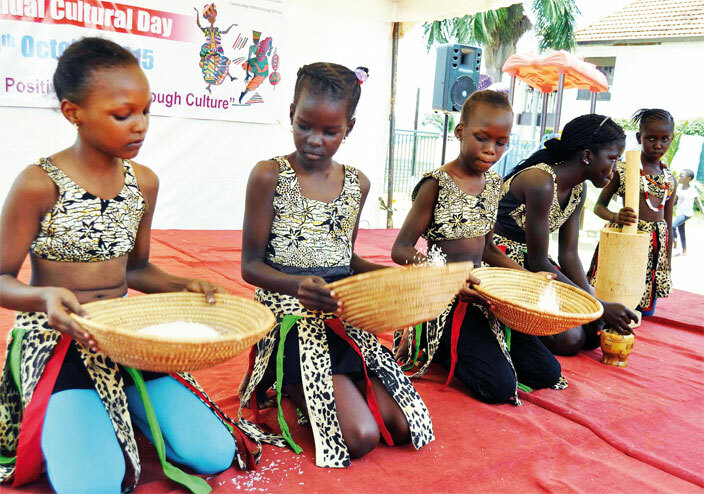 Students showcsing culture during culture day at Kabojja International School
Students showcsing culture during culture day at Kabojja International School
The journey
Before shifting to Buziga, a Kampala suburb, nine years ago, Kabojja International School was located on Masaka Road. The school has two sections; one for primary pupils and another one is for secondary students.
It is surrounded by green trees and it is out of city dust. The school has grown and it is still growing. It started with 50 learners, but now it has 450 students. "We are building a new campus. It shall accommodate primary pupils.
Out 450, 280 are local students, meaning that future is bright because parents are ready to bring their children to our school. This means that there is interest in international education as an alternative to the local system," Turya explains.
Currently, the primary pupils have to commute from home. The school has boarding facilities for students for higher classes. But it is not mandatory to be in boarding section. For those commuting from home, Barbara Byahurwa Tumusiime, the public relations officer of the school explains that the school has comfortable transport system.
"And in case you cannot pick the learner from school, you can opt for the school to do it for you. Our transport system is good. The students are picked and dropped at their homes with transport assistants. Once dropped at home, you must sign that the learner has come back," Tumusiime explains.
Tutoring students
The international school has personal tutors to take care of students in absence of parents. "A personal tutor is one of the teachers and he or she tutors about 10 students, meaning the tutor knows how they sleep, failures and strength and at the end of the day, the tutor has to make a report about the students,"Tumusiime explains.
There is an attachment between the students and the teachers. The practice helps the students in sharping their behaviour. Most schools are hit by drug abuse and the administrations do not want to talk about it. But Kabojja International School has got the counselling and guidance department. It has done a good job.
Career department
The career department helps the learners to select the universities and know the courses they want to pursue. The career department also does placement of students at early age, like year 11, an equivalent of Senior Four.
"They are placed in work places such as factories so that at year 11, you go and practice. If you cannot handle, you switch to business, where you think you can excel. One chooses a course in year 13; they have known what it involves. So we guide them a little bit earlier," Turya explains.
International
meals Tumusiime says the chefs prepare meals according to international standards. The menu is drafted by chefs, teachers, students and parents.
How long should the students be at school?
Turya notes that students study for three months. Kabojja runs on northern hemisphere calendar, which starts on the third week of August until December. "Another term start in early January and ends in March. Early April, we start the final term and complete in June. Those are the three terms in a year," he adds. The school also continues admitting in non-candidate classes, even though the academic year has started.
Affordable fees
Turya says the school fees are structured to be affordable for the middle and upper class person. "A civil servant can pay school fees in installments. We charge between $1,500 (about sh5m) to $1,900 (about sh6.6m)," he says
Games and drama
Apart from the academics, the school has a strong drama and music department. Tumusiime says it helps the learner, who is not doing well in academics, to excel in music and drama. About the games, Kabojja basketball and swimming teams are performing well.
Turya says most of the players in local clubs are students of the school. "We also teach students confidence that's why they are able to address a big gathering," he notes The school's interact club, associates with Rotary Club International. Students go out to do corporate social responsibility by reaching out to street children.
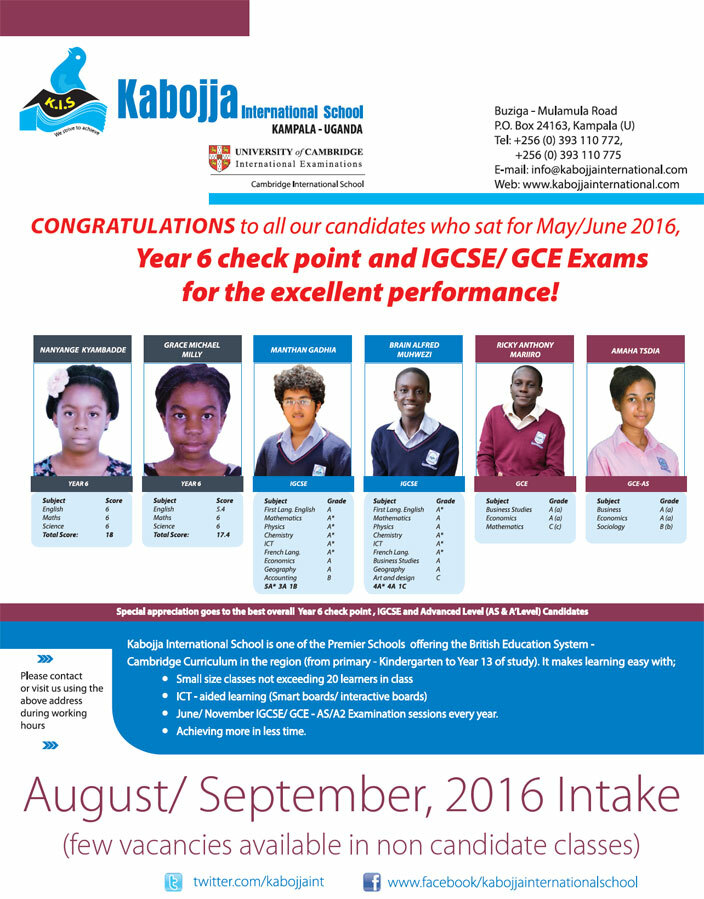
GEMS to open boarding section
By Michael Odeng
GEMS Cambridge International School in Kampala is opening up a boarding section. The official launch of the boarding facility is slated for August 31. The boarding section will house both girls and boys, aged seven to 18 years.
It has a capacity for 150 students, with a possibility for expansion. A globally-focused school, where college preparation meets 21stcentury innovation, GEMS school celebrates a diversity of learners with the rigorous BTEC programme and a renowned academic support programme.
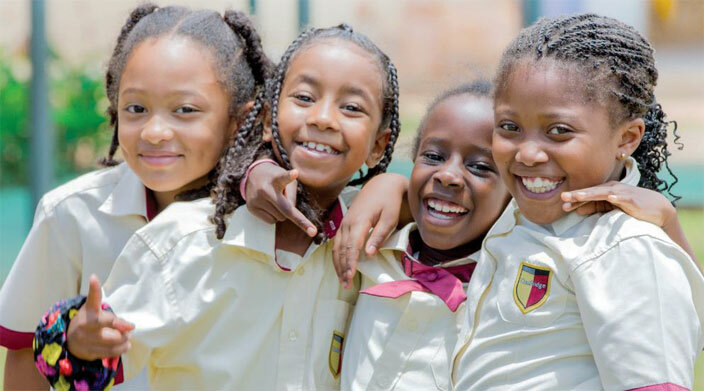 Some students of GEMS. The school aims at catering for the unique development needs of each child to help them discover their talents
Some students of GEMS. The school aims at catering for the unique development needs of each child to help them discover their talents
Enhanced security
Located in the serene and tranquil Butabika community, 12km away from Kampala city, the school has an environment conducive for learning. The security of children is assured, with CCTV cameras all over the premises.
It is situated next to the Royal Palms Estate, with a view of Lake Victoria. The school has a powerful classroom technology, which enriches and supports learning. The student, teacher ratio is 1:10. According to Solomon Rachkara, the head of sales and marketing at GEMS Cambridge International Kampala, focusing on a boarding facility provides a more conducive and learning experience for children, especially those who come from abroad.
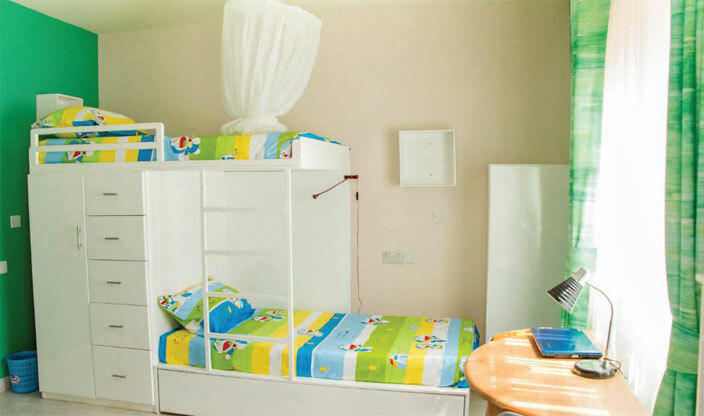 A bedroom at the school. The boarding facility will accommodate 150 children
A bedroom at the school. The boarding facility will accommodate 150 children
Rachkara says GEMS has come up with a tailor-made boarding solution to suit the needs of parent. Parents have weekends, week-days and termly boarding options that are both flexible and offer full value.
He says parents can enroll their children for just $60 (about sh202,000) during the GEMS taster/orientation weekend from August 26 to 28, to enjoy a threeday boarding experience at the school premises.
Rachkara also said a slot will be given to lucky winners following their GEMS TASTER TEASER Challenge on Facebook, Twitter, Instagram and YouTube. He says the move to start a boarding section was prompted by parents and the school's partners.
"It is Gems' tradition to listen to parents and partners and we have invested heavily to put up a world class boarding facility," he said. He added that they will charge fair prices for boarding.
Independent learning and innovation
The school encourages independent learning and empowers students to embrace responsibility. Through innovation, Mutesi said students find courage to challenge convention and dream of the possibilities because no idea is too small or too large if it makes life better. "We work to continually exceed expectations.
Just as we set educational standards for our schools, we ensure that everything we do is delivered to a high standard," she says. She adds: "Along with our students, we never stop learning." Rachkara says the students make active contribution to the local and global community so that they can build a sustainable planet to share.
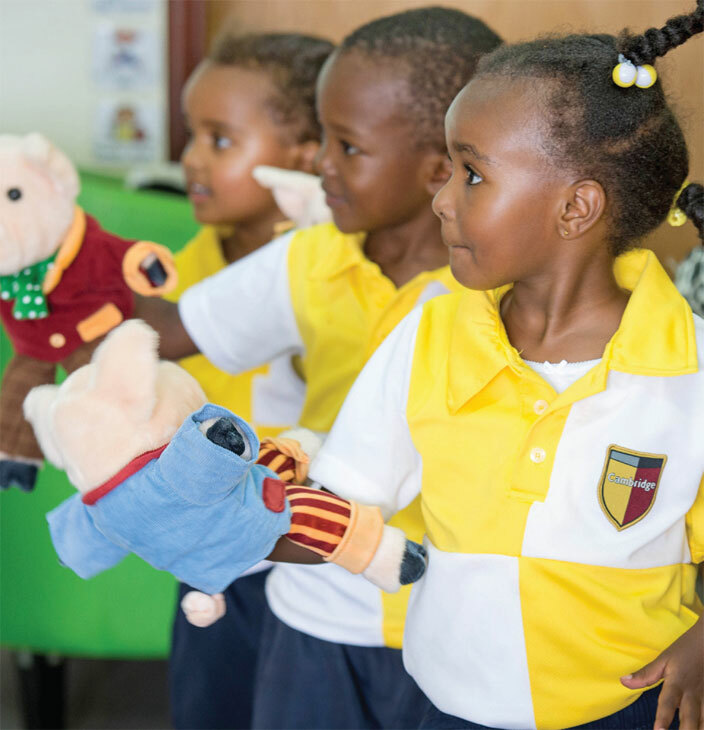 The pupils also learn through extra-curricular activities
The pupils also learn through extra-curricular activities
"We respect and celebrate our diversity and recognise that there are many things that unite us all, build bridges of knowledge, push boundaries and unite young people and also aim to produce not just great students, but great people who are honest and have integrity.
Rachkara says GEMS is not only known for being a quality service provider of a holistic Cambridge based Education, but also for being pace setters in innovation. GEMS has a one of a kind Food Techlab where children go and enjoy experimenting with dishes and cuisines from all over the world with guidance from expert chefs, hence enhancing their life skills and creativity.
The school also has state-ofthe- art music rooms, art studio, two swimming pools, indoor and outdoor basketball courts and two football soccer fields
|
The GEMS Cambridge network GEMS Cambridge Kampala is part of the GEMS Education, founded as Global Education Management Systems (GEMS), which is an international education company. It is a global advisory and educational management firm and is the largest operator of kindergarten to grade 12 schools in the world, with a network of over 90 schools in over 13 countries. GEMS has established universities all over the world. GEMS provides pre-school, primary and secondary education. Through its consultancy arm, GEMS Education Solutions, the company works internationally with public and private sector clients on school improvement initiatives. The Varkey Foundation, formerly known as the Varkey GEMS Foundation, is the philanthropic arm of GEMS Education. For every child enrolled in a GEMS school, we aim at impacting the lives of 100 unprivileged children. The school teaches the national curriculum for England from pre- foundation Stage (age two-and-a-half years) to Year 13 with academic excellence of an international standard. The school also offers students a chance to discover their talent by providing a diverse range of learning, enrichment and extra-curricular opportunities appropriate to each student's unique stage of development. The National Curriculum for England is a liberal and wide- ranging programme, introducing a broad range of contemporary subjects and topics. It has an inspiring range of science, humanities and arts syllabuses that encourage a rich and varied education which teaches them to look at the world with balance and an open mind. The school's main goal is to nurture students' confidence and independence, giving a child the educational support they need to grow into flexible and resilient young adults, ready to succeed in an ever-more competitive and globalised world. Brenda Mutesi, the parent's relations executive, said GEMS provide, opportunities for students to develop their full, allaround potential through a rich academic programme, combined with a variety of extra-curricular activities. |
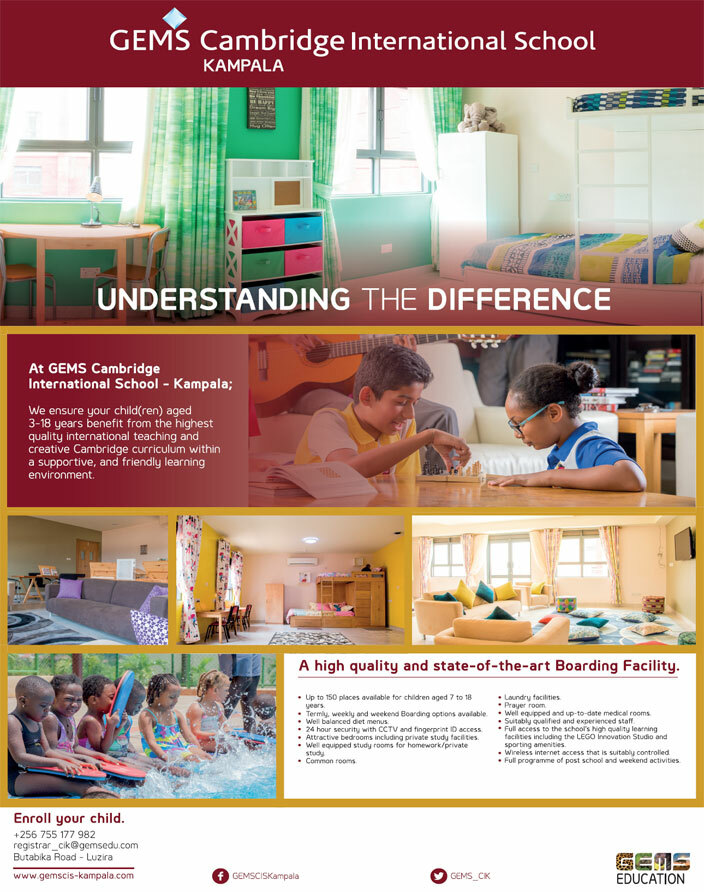
Aga Khan offers holistic education
By Vision Reporter
Established in 1959 in Old Kampala, the Aga Khan Education Services Uganda (AKESU) has distinguished itself by the quality of its staff and students. It is seen as the first multicultural school in Uganda and the present-day school continues to play a unique educational role in the country.
Over the years, AKESU has come to be recognised as one of the quality institutions of learning, providing education from the nursery to secondary level. It strives to create a harmonious balance between academic demands, sporting and cultural activities and community life.
They challenge students to be intellectually inquisitive and socially conscious. They believe that while what students know is important, the true measure of a student's education is the ability to analyse what they do not know. Stephen Mawanda, the head of admissions says the school offers the British national curriculum, from Year one to Year six at the primary school level and at the high school.
The British curriculum leading to International Certificate of Secondary Education (IGCSE) is provided, followed by the prestigious International Baccalaureate Diploma Programme (IBD) in Year 12 and Year 13.
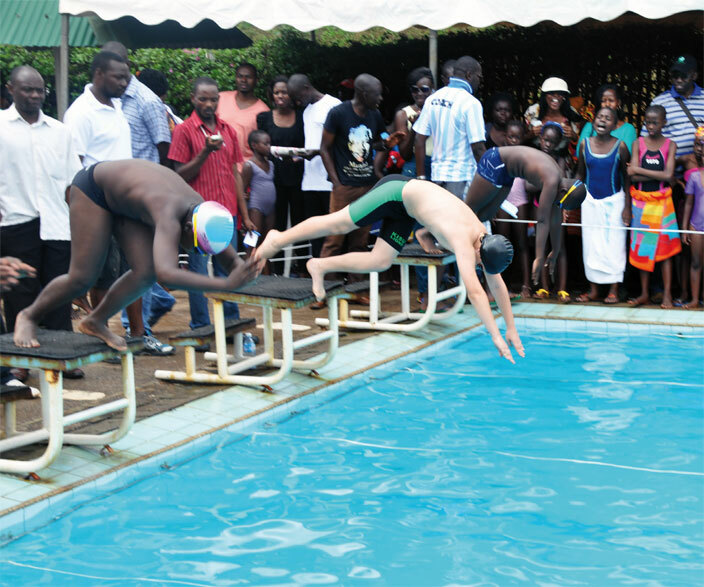 Aga Khan creates a balance between academics, sporting and cultural activities and community life
Aga Khan creates a balance between academics, sporting and cultural activities and community life
About the IGCSE
It is a world-recognised qualification based on the British General Certificate of Education (GCSE) and caters to different levels of ability and is a flexible course of study that provides a broad knowledge base and life-long skills.
Students enjoy interesting, creative, more applied aspects of the subjects. They develop skills, which are assessed and credited based on specified criteria. Two particularly notable skills are the mastery of language and interpretation of data/ research material.
Course requirements and examinations are administered from Cambridge University. There is an assessed coursework option alongside examinations The IGCSE ideally prepares students for the International Baccalaureate (IB) Diploma programme.
About IBD
The diploma is a two-year preuniversity skills-based course administered from the IB organisation in Geneva. AKESU started offering it in 2005. The biggest challenge most students face with the IBD is meeting deadlines.
Coursework for the diploma involves research leading to written or oral presentations. This experience builds student confidence and a can-do attitude. The choice of curriculum depends on the education plan parents have for their children and affordability.
Play time at AKESU
They do ballet, cookery, swimming, scouting, piano, taekwondo, chess, basketball, badminton, lawn tennis, music and tailoring, among others. "The Aga Khan School is multicultural, offering a holistic and pluralistic enriched educational experience for the diversified constituency. Students are encouraged to pursue excellence not only in academics, but also in all areas of school life; sports, drama and music, thereby building their self-confidence," Mawanda explains.
Excellent teachers
The school employs teaching staff from within and outside Uganda. Teachers are recruited through a rigorous selection process based on their qualification and experience.
A strong professional development programme exists to ensure that staff is up-to-date with contemporary teaching and learning approaches and assessment of students' learning outcomes. Many of AKESU's teachers have masters degrees; some are distinguished authors, examiners, researchers or curriculum developers.
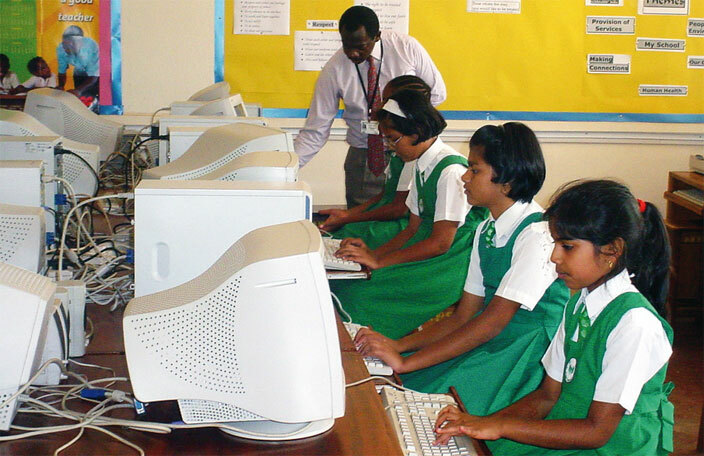 Pupils in class at Aga Khan. Learners are always taught to be confident with a can-do attitude
Pupils in class at Aga Khan. Learners are always taught to be confident with a can-do attitude
AKESU emphasises continuous staff professional development. The high school is part of the International Academic Partnership, which promotes global education and student-centred teaching at participating schools. The School regularly organises workshops and seminars for management and teaching staff. In-house implementation of best practice methodology is overseen by senior staff.
Transfer from other schools
Students who wish to join AKESU mid-course must provide necessary information and may be required to sit for an entrance test and (or) interview. A recommendation of good conduct and a leaving certificate from the previous school are necessary. Individual arrangements are made to place the student in the most appropriate class, if a place is available.
Scholarships
Financial assistance of a limited fund is available to assist highachieving and deserving students, whose families may not be able to afford full fees. The school's careers counsellor works closely with students on their subject choices, university applications and career decisions through the formative years of secondary education.
Student population at the Aga Khan School comprises over 30 nationalities. According to the Aga Khan: "A great school will educate its students not merely to be personally successful, but also to use their gifts to build their communities and enhance the common good to levels beyond our dreams."
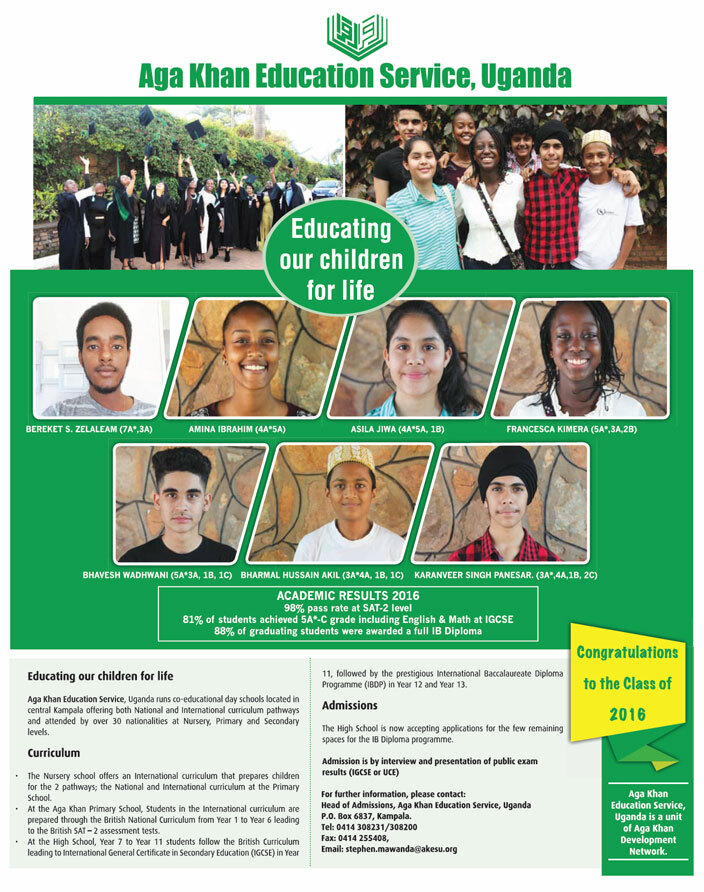
KISU scaling international heights
By Richard Wetaya
 KISU's director Steve Lang
KISU's director Steve LangMany parents put a lot of thought to picking schools for their children. Usually, it is a tough call, given the wide selection of schools with good pedigree. Increasingly, however, more and more parents are sending their children to study in schools where they are prepared and put through an educational mill that, at length, develops their children into lifelong learners and enables them to excel and compete favourably in the world.
Schools that offer multi-faceted international educational curricula, perspectives and provide a unique edge to children have come in handy in this regard. Among these is Kampala International School (KISU), owned by the Ruparelia Group of companies.
Founded in 1993, KISU began as a primary school with a curriculum based on the national curriculum for England. Each year, the school's student body is made up of 15-20% Ugandan children. The rest are from more than 50 other countries around the world.
KISU offers an inspiring and wellrounded international education to students from two-18 years. The school maintains its aims and teaching philosophy at par with the best international school across the globe. An international outlook is highly valued and students develop a good understanding of their multicultural world.
Steve Lang, the KISU director, says an education at an excellent international school is one of the greatest gifts that parents can bestow upon their children. "International schools are uniquely placed to prepare young people to fl ourish and lead in the global village that they will enter as adults,"
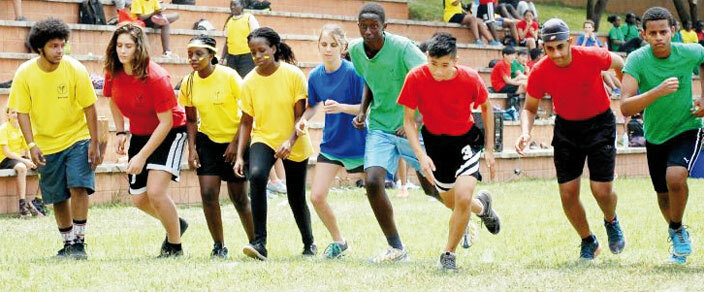 Students taking part in athletics competitions at KISU recently
Students taking part in athletics competitions at KISU recently
What makes KISU unique?
Lang says KISU is the only international school in Uganda with full accreditation from the prestigious Council for International Schools (CIS). The CIS is a membership community committed to high quality international education.
"Being accredited by the CIS means that we are subject to regular and rigorous checks on the quality of our provision. KISU is also accredited by the International Baccalaureate Organisation (IBO), University of Cambridge International Exams Board and the New England Association of Schools and Colleges (NEASC)," he explains.
The school has a 25m swimming pool; three IT labs; fi ve science labs; specialist learning spaces for music, art, food technology, design technology and drama. The school also has three outdoor performance spaces, an auditorium, an indoor sports centre, a discrete LEGO Studio, two libraries and fi ve acres of green sports fi elds.
All the school's classrooms are equipped with interactive whiteboards to enhance the learning experience. "In KISU, students come from more than 50 countries around the world. The school is, therefore, uniquely placed to prepare students to succeed in the global village," Lang explains.
KISU's uniqueness has also, through the years, been manifested in the high proportions of internationally recruited teachers. "KISU exercises the very best recruitment policy, with a large number of our teachers recruited from the international teacher recruitment fairs held each year around the world.
That is an edge, which KISU has over its competitors. The school is continually enriched by an infl ow of the very latest in pedagogical and learning advances from around the world," Lang adds. In addition to the above, KISU spends at least $60,000 (about sh202m) per annum on training and developing its teachers, so that they provide the very best learning experiences for its learners.
This year also saw KISU setting forth on a new programme. The school started issuing all of its IB students with complimentary Chrome books fully loaded with the Google Apps for Education software platform that is used by many top universities around the world (including seven of eight Ivy League schools).
"KISU is committed to knowing and understanding our learners as individuals, so as to ensure that we give them personalised support in making the very best progress that they can have. The school uses sophisticated Cognitive Abilities Tests (CAT4 Tests) to identify each learner's preferred learning style and to track progress towards personalised targets," Lang explains.
In many respects, KISU students have long established themselves as creative, refl ective and resilient learners; they are confi dent, articulate and friendly and are known for their high standards of behaviour, says Lang.
Curricula followed at KISU
KISU follows the English National Curriculum up to the age of 14 (the school adapts it so that it can refl ect the Ugandan context), Cambridge IGCSE at ages 15 and 16 and the International Baccalaureate (IB) Diploma, probably the world's foremost university entrance qualifi cation, for students aged 17 and 18.
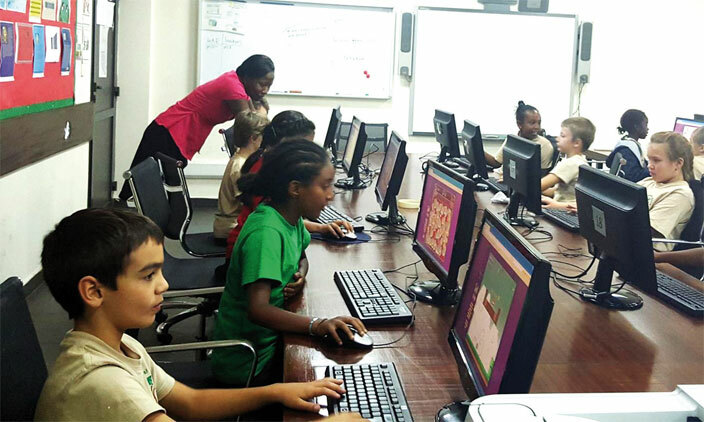 Pupils undertaking technology lessons in one of the school's labs
Pupils undertaking technology lessons in one of the school's labs
What lies at the root of KISU's academic success
According to Lang, small class sizes have been one of the contributors to KISU's academic success. "Small classes ensure high levels of high-quality teacher/pupil interaction in lessons. In our primary section, class sizes are generally around 23, with one teacher and an assistant. In the secondary section, it is even much lower.
Research has continually shown that the smaller the class size, the better the academic performance." He adds: "Students' progress towards statistically rigorous, personalised targets is constantly monitored, to ensure each individual learner achieves their full potential," Lang adds.
The school has invested heavily in the provision of high-quality electronic and digital learning resources to enhance the learning experience and motivate learners, such as complimentary Chromebooks for IB students; fast and reliable fi bre-optic based Wi-Fi throughout the school; and interactive whiteboards in every classroom.
Lang reveals that the school spends about $90,000 (sh300m) annually on high-quality learning resources and textbooks "KISU is committed to the IB learner profi le and, through the planning and delivery of engaging, child-centred learning activities, creates high levels of motivation and enthusiasm for learning in its students.
Students are taught to be refl ective about their own learning and to take ownership of their own learning journeys through subjects like Learning to Learn and Theory of Knowledge," Lang elaborates.
Co-curricular activities at the school
KISU has more than 50 clubs engaging youth interested in sports, such as chess, basketball, roller skating, performing arts, crafts, languages and other hobbies. "At KISU, students must involve themselves in community service activities each year and the school employs a community action and service co-ordinator to organise these.
All students from the age of 10 have the opportunity to experience a residential outdoor education experience each year. The school offers a range of overseas trips, such as the annual skitrip to Switzerland or the language department trip to France," Lang notes.
|
Other schools Two other schools owned by Ruparelia Group include Delhi Public school and Kampala Parents School. Delhi Public School Another school striving to ensure that its pupils get holistic learning that meets global standards, is Delhi Public School, located next to Kampala Parents school. "Through the Indian NCERT curriculum, the school aims to deliver an education that has evolved over many thousand years into a world-class, globally respected system that has propelled India into an IT and knowledge superpower," Mary Jacob, the school's principal, says. Jacob says the Delhi Public School learning Framework allows children to be ‘children', letting them realise their potential, by making provisions for opportunities, where teachers link pedagogy with their life at home and the interaction in the classrooms with their experiences with nature. "Delhi School is not just about academic brilliance; it is also about being a knowledge centre of holistic education. Through our integrated learning approach, the school aims to nurture children's thinking, analysing and learning skills, creating value-conscious global citizens dedicated to personal and professional excellence — refl ecting our philosophy of creating a multi-cultural learning community of leaders who will lead by example," she says. The school also lays emphasis on extracurricular activity for its students. Kampala Parents School At first glance, Kampala Parents School looks more like an International School, yet it is not. This is on account of its facilities and environment. Established in 1975, the school's performance pedigree has invariably been up to the mark through the years, principally due to the professionalism of the school's teaching staff. "At Kampala Parents School, our teachers are measured, not only by their professional qualifi cations, but also for their ability to continuously enrich and enhance student learning. The children are given an all round education. Products of the school invariably maintain the standards and values wherever they go," Mrs Daphine Kato, the school's principal, explains. Kato adds that one of the schools other standout qualities, has been its adventurous curriculum, which, she says, has stimulated and motivated the pupils. Kampala Parents has some of the best sports facilities in the country. Its different recreational facilities mean that children learn different sporting disciplines in the course of their stay at the school. |